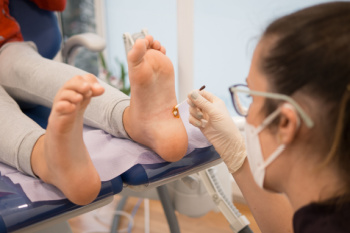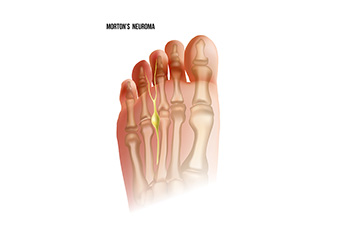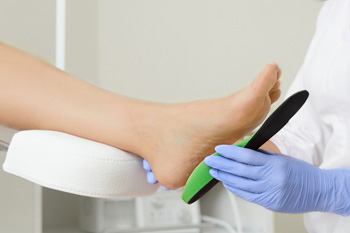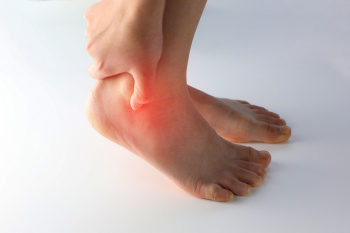Connect With Us
Blog
Items filtered by date: April 2024
Understanding Common Causes of Foot Pain

Foot pain can affect individuals of all ages and lifestyles, impacting mobility and quality of life. One frequent reason for this type of pain is wearing improper footwear, such as shoes that are too tight, narrow, or lacking in support, leading to conditions like bunions, corns, and ingrown toenails. Overuse or repetitive strain on the feet, often seen in athletes or individuals with occupations that require prolonged standing or walking, can result in plantar fasciitis, stress fractures, and tendonitis. Additionally, structural abnormalities, such as flat feet, high arches, or misalignment of the bones, can contribute to chronic foot pain and discomfort. Systemic conditions like arthritis, diabetes, and circulatory disorders may also result in foot pain. Foot pain can be successfully treated by a podiatrist. If you have any type of foot pain, it is strongly suggested that you visit this type of doctor who can offer you appropriate treatment solutions.
Foot Pain
Foot pain can be extremely painful and debilitating. If you have a foot pain, consult with Vivian C. Iwu, DPM from Choice Podiatry Center. Our doctor will assess your condition and provide you with quality foot and ankle treatment.
Causes
Foot pain is a very broad condition that could be caused by one or more ailments. The most common include:
- Bunions
- Hammertoes
- Plantar Fasciitis
- Bone Spurs
- Corns
- Tarsal Tunnel Syndrome
- Ingrown Toenails
- Arthritis (such as Gout, Rheumatoid, and Osteoarthritis)
- Flat Feet
- Injury (from stress fractures, broken toe, foot, ankle, Achilles tendon ruptures, and sprains)
- And more
Diagnosis
To figure out the cause of foot pain, podiatrists utilize several different methods. This can range from simple visual inspections and sensation tests to X-rays and MRI scans. Prior medical history, family medical history, and any recent physical traumatic events will all be taken into consideration for a proper diagnosis.
Treatment
Treatment depends upon the cause of the foot pain. Whether it is resting, staying off the foot, or having surgery; podiatrists have a number of treatment options available for foot pain.
If you have any questions, please feel free to contact our office located in Marietta, GA . We offer the newest diagnostic and treatment technologies for all your foot care needs.
Where Are Plantar Warts Found?

Plantar warts, medically termed Verruca plantaris, are common skin growths caused by the human papillomavirus, or HPV. These warts typically appear on the soles of the feet, often in areas subjected to pressure or friction, such as the heels or balls of the feet. Plantar warts often manifest as small, rough, grainy lesions with black dots, or wart seeds, scattered throughout. These black dots are actually tiny blood vessels. While plantar warts are usually harmless, they can cause discomfort or pain, especially when walking or standing. The HPV virus enters the body through small cuts or breaks in the skin, making individuals who frequently walk barefoot in communal areas more susceptible to infection. Treatment options for plantar warts range from remedies like salicylic acid patches or freezing kits to medical procedures performed by podiatrists. Seeking prompt treatment is essential to alleviate symptoms and prevent the spread of plantar warts to other areas of the feet or other individuals. If you have a plantar wart, it is suggested that you schedule an appointment with a podiatrist who can offer the best treatment option for you.
Plantar warts can be very uncomfortable. If you need your feet checked, contact Vivian C. Iwu, DPM from Choice Podiatry Center. Our doctor will assist you with all of your foot and ankle needs.
About Plantar Warts
Plantar warts are the result of HPV, or human papillomavirus, getting into open wounds on the feet. They are mostly found on the heels or balls of the feet.
While plantar warts are generally harmless, those experiencing excessive pain or those suffering from diabetes or a compromised immune system require immediate medical care. Plantar warts are easily diagnosed, usually through scraping off a bit of rough skin or by getting a biopsy.
Symptoms
- Lesions on the bottom of your feet, usually rough and grainy
- Hard or thick callused spots
- Wart seeds, which are small clotted blood vessels that look like little black spots
- Pain, discomfort, or tenderness of your feet when walking or standing
Treatment
- Freezing
- Electric tool removal
- Laser Treatment
- Topical Creams (prescription only)
- Over-the-counter medications
To help prevent developing plantar warts, avoid walking barefoot over abrasive surfaces that can cause cuts or wounds for HPV to get into. Avoiding direct contact with other warts, as well as not picking or rubbing existing warts, can help prevent the further spread of plantar warts. However, if you think you have developed plantar warts, speak to your podiatrist. He or she can diagnose the warts on your feet and recommend the appropriate treatment options.
If you have any questions please feel free to contact our office located in Marietta, GA . We offer the newest diagnostic and treatment technologies for all your foot and ankle needs.
Custom Orthotics For Outdoor Activity

Embrace the great outdoors with confidence and comfort! Whether you're hiking, jogging, or exploring nature, Custom Orthotics are your perfect companion. Tailored to your foot's unique needs, they provide stability on uneven terrains and cushioning for those longer adventures. Don't let foot discomfort limit your outdoor experiences. With Custom Orthotics, every step is supported and secure. Call today to schedule an appointment.
Reminder: When Was the Last Time...?
Causes and Nature of Morton's Neuroma

Morton's neuroma, a common foot condition, occurs when a nerve in the ball of the foot becomes thickened and inflamed, leading to pain and discomfort. This condition typically affects the area between the third and fourth toes but can also occur between other toes. The exact cause of Morton's neuroma is not always clear, but it often develops due to repetitive stress or irritation on the nerve, such as wearing tight or high-heeled shoes that compress the forefoot. Activities that involve repetitive pressure on the ball of the foot, such as running or participating in high-impact sports, can also contribute to the development of Morton's neuroma. Additionally, foot deformities like bunions, hammertoes, or flat feet may increase the risk. Understanding the underlying causes of Morton's neuroma is important for effective management and prevention strategies, which may include wearing supportive footwear, using orthotic inserts, and avoiding activities that exacerbate symptoms. If you have pain in this part of your foot, it is strongly suggested that you are under the care of a podiatrist who can accurately diagnose and treat Morton’s neuroma.
Morton’s neuroma is a very uncomfortable condition to live with. If you think you have Morton’s neuroma, contact Vivian C. Iwu, DPM of Choice Podiatry Center. Our doctor will attend to all of your foot care needs and answer any of your related questions.
Morton’s Neuroma
Morton's neuroma is a painful foot condition that commonly affects the areas between the second and third or third and fourth toe, although other areas of the foot are also susceptible. Morton’s neuroma is caused by an inflamed nerve in the foot that is being squeezed and aggravated by surrounding bones.
What Increases the Chances of Having Morton’s Neuroma?
- Ill-fitting high heels or shoes that add pressure to the toe or foot
- Jogging, running or any sport that involves constant impact to the foot
- Flat feet, bunions, and any other foot deformities
Morton’s neuroma is a very treatable condition. Orthotics and shoe inserts can often be used to alleviate the pain on the forefront of the feet. In more severe cases, corticosteroids can also be prescribed. In order to figure out the best treatment for your neuroma, it’s recommended to seek the care of a podiatrist who can diagnose your condition and provide different treatment options.
If you have any questions, please feel free to contact our office located in Marietta, GA . We offer the newest diagnostic and treatment technologies for all your foot care needs.
Benefits of Custom-Made Foot Orthotic

Custom-made foot orthotics are personalized shoe inserts crafted to address specific foot issues and biomechanical imbalances. They offer tailored support and comfort, making them highly effective in treating various conditions, such as plantar fasciitis, bunions, flat feet, and types of arthritis. Compared to off-the-shelf shoe inserts, custom-made orthotics provide superior support and alignment correction because they are designed based on a detailed assessment of an individual's foot structure, gait pattern, and specific needs. This customization ensures optimal fit and functionality and results in better outcomes and increased comfort for the wearer. The process of making custom orthotics typically involves taking impressions or scans of the feet, followed by precise measurements and molding of materials to create inserts that fit the unique contours of your foot. This meticulous approach ensures that the orthotics provide the necessary support and alleviate symptoms associated with certain foot conditions, ultimately improving mobility and overall quality of life. If you have foot problems, it is suggested that you make an appointment with a podiatrist for an evaluation and discussion of whether custom orthotics can help you.
Discover relief from persistent foot pain with custom orthotics and shoe inserts. If you’re battling heel pain, these personalized solutions offer targeted support, addressing the root causes of discomfort. Customized to your unique biomechanics, these inserts provide stability, alleviating both heel and foot pain. Say goodbye to the agony of every step and hello to a life free from constant foot pain. Invest in your well-being with custom orthotics or shoe inserts ensuring your feet receive the care they deserve. Step confidently, step comfortably – because a pain-free journey begins with the right support.
If you have any questions please contact our office located in Marietta, GA . We offer the newest diagnostic and treatment technologies for all your foot and ankle needs.
Understanding Foot Changes During Pregnancy

Pregnancy is marked by numerous changes in the body, including the feet. One notable alteration is the increase in shoe size experienced by many expectant mothers. This change occurs due to hormonal fluctuations and the body's natural tendency to retain fluids, which leads to swelling in the feet and ankles. Consequently, women may find that their usual shoe size feels snug or uncomfortable during pregnancy, necessitating the need for larger footwear to accommodate the swelling. Additionally, some pregnant individuals may encounter itching and redness on the soles of their feet, a condition known as pruritus gravidarum. This symptom can arise due to heightened blood circulation, hormonal changes, or skin stretching, causing discomfort and irritation. While these foot changes are a normal part of pregnancy, expectant mothers need to prioritize foot health by wearing supportive footwear, practicing gentle foot exercises, and elevating the feet to reduce swelling. Consulting with a podiatrist can also guide in managing foot discomfort and ensuring a smooth pregnancy journey. If you are seeking relief from foot conditions developed during pregnancy, it is suggested that you consult a podiatrist.
Pregnant women with swollen feet can be treated with a variety of different methods that are readily available. For more information about other cures for swollen feet during pregnancy, consult with Vivian C. Iwu, DPM from Choice Podiatry Center. Our doctor will attend to all of your foot and ankle needs.
What Foot Problems Can Arise During Pregnancy?
One problem that can occur is overpronation, which occurs when the arch of the foot flattens and tends to roll inward. This can cause pain and discomfort in your heels while you’re walking or even just standing up, trying to support your baby.
Another problem is edema, or swelling in the extremities. This often affects the feet during pregnancy but tends to occur in the later stages.
How Can I Keep My Feet Healthy During Pregnancy?
- Wearing orthotics can provide extra support for the feet and help distribute weight evenly
- Minimize the amount of time spent walking barefoot
- Wear shoes with good arch support
- Wear shoes that allow for good circulation to the feet
- Elevate feet if you experience swelling
- Massage your feet
- Get regular, light exercise, such as walking, to promote blood circulation to the feet
If you have any questions please feel free to contact our office located in Marietta, GA . We offer the newest diagnostic and treatment technologies for all your foot and ankle needs.
The Definition of Tarsal Tunnel Syndrome

Tarsal tunnel syndrome, though less commonly known than other foot conditions, can cause significant discomfort and impairment for those affected. Similar to carpal tunnel syndrome in the wrist, tarsal tunnel syndrome involves compression of the posterior tibial nerve as it passes through a narrow space in the ankle called the tarsal tunnel. This compression can result from various factors, including injury, inflammation, or underlying conditions like arthritis or diabetes. Symptoms of tarsal tunnel syndrome may include burning pain, tingling, numbness, or weakness in the foot and ankle, often worsened by prolonged standing or walking. Left untreated, tarsal tunnel syndrome can lead to permanent nerve damage and functional limitations. Diagnosis typically involves a thorough physical examination, along with imaging studies like MRI or nerve conduction tests. Early recognition and intervention are critical for managing tarsal tunnel syndrome effectively and minimizing long-term consequences. If you have any of the above symptoms, it is suggested that you confer with a podiatrist who can offer you effective treatment solutions.
Tarsal tunnel syndrome can be very uncomfortable to live with. If you are experiencing tarsal tunnel syndrome, contact Vivian C. Iwu, DPM of Choice Podiatry Center. Our doctor can provide the care you need to keep you pain-free and on your feet.
Tarsal Tunnel Syndrome
Tarsal tunnel syndrome, which can also be called tibial nerve dysfunction, is an uncommon condition of misfiring peripheral nerves in the foot. The tibial nerve is the peripheral nerve in the leg responsible for sensation and movement of the foot and calf muscles. In tarsal tunnel syndrome, the tibial nerve is damaged, causing problems with movement and feeling in the foot of the affected leg.
Common Cause of Tarsal Tunnel Syndrome
- Involves pressure or an injury, direct pressure on the tibial nerve for an extended period of time, sometimes caused by other body structures close by or near the knee.
- Diseases that damage nerves, including diabetes, may cause tarsal tunnel syndrome.
- At times, tarsal tunnel syndrome can appear without an obvious cause in some cases.
The Effects of Tarsal Tunnel Syndrome
- Different sensations, an afflicted person may experience pain, tingling, burning or other unusual sensations in the foot of the affected leg.
- The foot muscles, toes and ankle become weaker, and curling your toes or flexing your foot can become difficult.
- If condition worsens, infections and ulcers may develop on the foot that is experiencing the syndrome.
A physical exam of the leg can help identify the presence of tarsal tunnel syndrome. Medical tests, such as a nerve biopsy, are also used to diagnose the condition. Patients may receive physical therapy and prescriptive medication. In extreme cases, some may require surgery.
If you have any questions please feel free to contact our office located in Marietta, GA . We offer the newest diagnostic and treatment technologies for all your foot and ankle needs.


